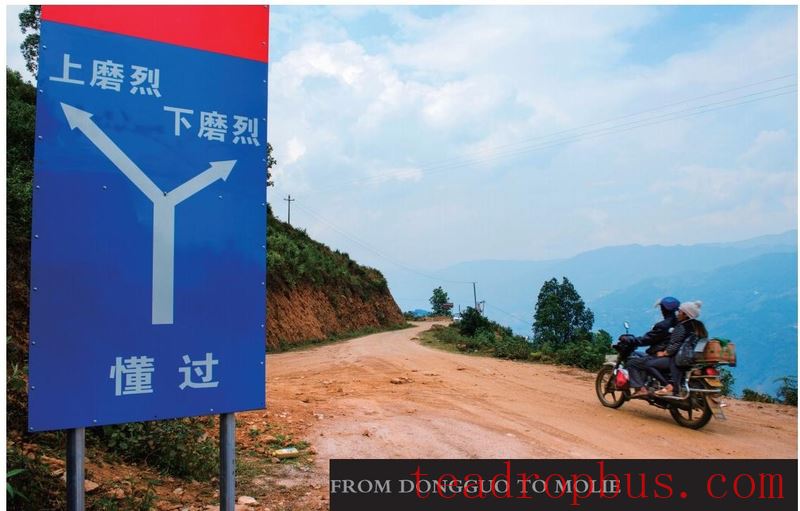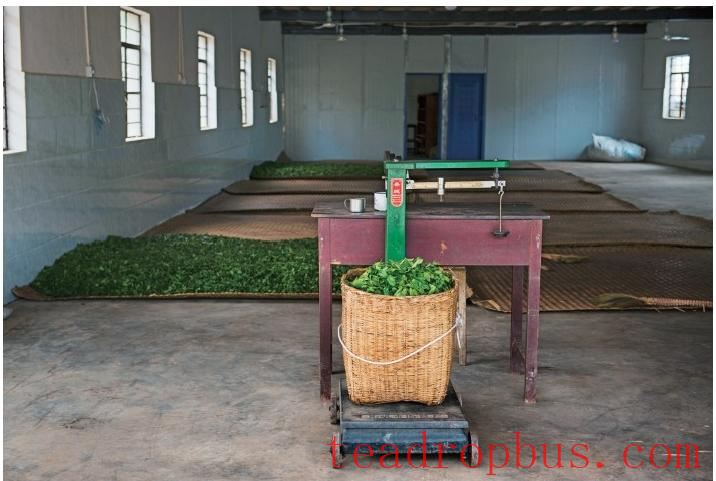
The whole Mengku area is a unique presence in Dongguo. It's an eastern mountain in the western half of the mountain range. Its distinctive taste of bitterness turning into sweetness makes it “the most un-Mengku-like Tea in Mengku.” It has Molie, which bears the name “Mengku Banzhang,” and even its name can spark endless imagination…
The “Highway” to Dongguo
To find out more, on April 29th as the sun was just rising, Wang Xiaofeng had already taken us on the road to Dongguo. Wang Xiaofeng is responsible for raw material procurement and base production at Yunnan Tianpu Liu Xiang Tea Company, and he is also a fan of off-road rally racing. The car moved along the asphalt road of Linmeng Line, leaving the hustle and bustle of Mengku Town behind. The sound of the Nanmeng River flowing powerfully struck my heart and then rushed away without looking back. The beautiful Ceiba trees by the riverbank were covered with purple flowers, like bright red flames, captivating the heart.
Dongguo is located on a spur of the Bangma Snow Mountain at an altitude of 1,750 meters, facing Dahu Sai and the Bangma Snow Mountain, as if it were an eastern mountain born from the western half of the mountain range. Standing in the village, you cannot see the eastern mountains; from the Mengku basin or the villages of Nanao and Bamu in the eastern mountains, you cannot see Dongguo either. Wang Xiaofeng said that in the 1990s, the only way out of Dongguo was a very narrow ancient path, and tractors could only enter in 2000. Because the journey was so arduous, not many people went to Dongguo. It wasn't until 2007 when cars could reach Dongguo that it gradually became known to people. In recent years, more people have visited Dongguo, and Dongguo tea has won people's hearts with its balanced bitterness and astringency and strong tea qi.
After driving for about seven or eight minutes, we reached the fork in the road leading to Dongguo. Previously, the path to Dongguo was a narrow trail winding through the mountains, impassable when there was a landslide. Today, it is paved with neatly aligned gravel, allowing rainwater to quickly seep underground and prevent slipping. This road has become the easiest to travel on in the villages of the western mountains, and people jokingly refer to it as the “highway” of the western mountains. Listening to Wang Feng's “I'm the Most Swingin',” we arrived at the Dongguo Ji Yun Tea Factory in no time. The Dongguo Village Committee consists of four villages: Yizhai, Wai Zhai, Molie, and Baqi Shan, with over 400 households in total. The village has nearly 6,000 mu of tea gardens, with ancient tree tea and medium-sized tea gardens roughly equally divided. Yizhai and Wai Zhai are mostly inhabited by Han Chinese, and the tea factory is located in Dongguo Yizhai.

The Past of Selling Tea by Carrying on Backs and Leading Horses
As soon as we got out of the car, the cool air made me take a deep breath, as if I wanted to merge myself with this mountain forest. Wang Xiaofeng led us along the village's dirt road to the ancient tea garden. We saw tea trees in front of and behind the houses in the village, as well as on the slopes. At a place where the slope had fractured, there was a tea tree only one meter tall, but the exposed roots on the cross-section were thicker than the height of the tree itself, clearly demonstrating the saying that the taller the tree, the deeper the roots. Not far away was the ancient tea garden. The distance between the tea trees and the rows was relatively neat, indicating that they were artificially cultivated. The tea trees were robust and lush, with one tree measuring over 160 centimeters in circumference being revered by the locals as the “tea king tree,” and there were several other ancient tea trees that were only slightly smaller than the “tea king tree.”
Back at the tea factory, under a two- or three-hundred square-meter shed, some Black Tea was laid out to dry, and inside the shed were bags of sun-dried raw tea packed in woven bags. The tea factory belonged to Li Jindan's family, and she, aged 36, pointed to the black tea under the shed and said that before 2005, most of the fresh leaves in the village were made into black tea, but now, unless it was a customer's custom order, her family only made Pu'er tea.
When talking about her family's tea factory and selling tea, the originally shy Li Jindan opened up. Her family had a few hundred mu of tea gardens, some of which were allocated by the village, and others were newly planted with tea seeds in barren land. In earlier years, the highest price for fresh leaves was only a few yuan, enough to buy some salt. To make a living, the villagers also grew corn and wheat. In 2004, her family built the first Tea processing facility in Dongguo. Due to limited processing technology, the raw tea did not sell for much, and most of the time, they sold the fresh leaves directly. However, because the roads were difficult to navigate, the fresh leaves could only be sold by carrying them on backs or leading horses. The horse teams were settled in advance at home, and the horse feed had to be prepared. The fresh leaves were packed in woven bags the night before, and sometimes it took more than ten horses to carry the tea. They would set out early the next morning at five or six o'clock, and although the distance was less than 20 kilometers, the horse team wouldn't arrive in Mengku Town until after eleven. In 2007, tractors could reach the village, making transportation somewhat easier. But during the rainy season, when landslides occurred, they still had to hire horse teams to carry the fresh leaves past the landslide areas. Once the fresh leaves were taken out, they had to be sold. On good days, they could earn a few hundred or even a thousand yuan, but sometimes they had to sell them even if they didn't make any profit, as it was impossible to bring the fresh leaves back.
After 2007, the Pu'er tea market boomed, and tea merchants began coming to the village of Dongguo to buy tea. At that time, the price per kilogram of dry raw tea rose to over 30 yuan. After 2009, the price of Pu'er tea continued to rise, and Li Jindan's husband, Qiu Ji Yun, began learning to improve the processing technology of raw tea. He befriended people from state-owned tea factories and learned from those who came to the village to buy tea, and then tried making tea himself at home. When going out, Qiu Ji Yun always brought the tea he made himself, brewing it for everyone wherever he went, summarizing their opinions, and improving his tea-making techniques when he returned home.
After 2010, in order to have more stable customers, Li Jindan's family began cooperating with large tea factories in Mengku. With contracts in hand, when their own tea production was insufficient, they bought fresh leaves from other families, gradually expanding their operations. In 2012, Li Jindan's family started collaborating with Tianpu Liu Xiang Tea Company. The CEO of Tianpu Liu Xiang, Zhang Peng, provided them with technical and financial support, helping them build their current factory and expand their business. Last year, Li Jindan's family collected nearly 30 tons of tea, accounting for about two-thirds of Yizhai's tea production. This year, due to a decrease in fresh leaf production but an improvement in quality, the bulk price of Dongguo ancient tree first spring raw tea was 480 to 500 yuan per kilogram. From 10 yuan per kilogram in 2004 to 500 yuan today, the price has increased fifty-fold. The Lis' business has grown bigger, and creating their own Pu'er tea brand has become the most important thing Li Jindan wants to do in the last couple of years.